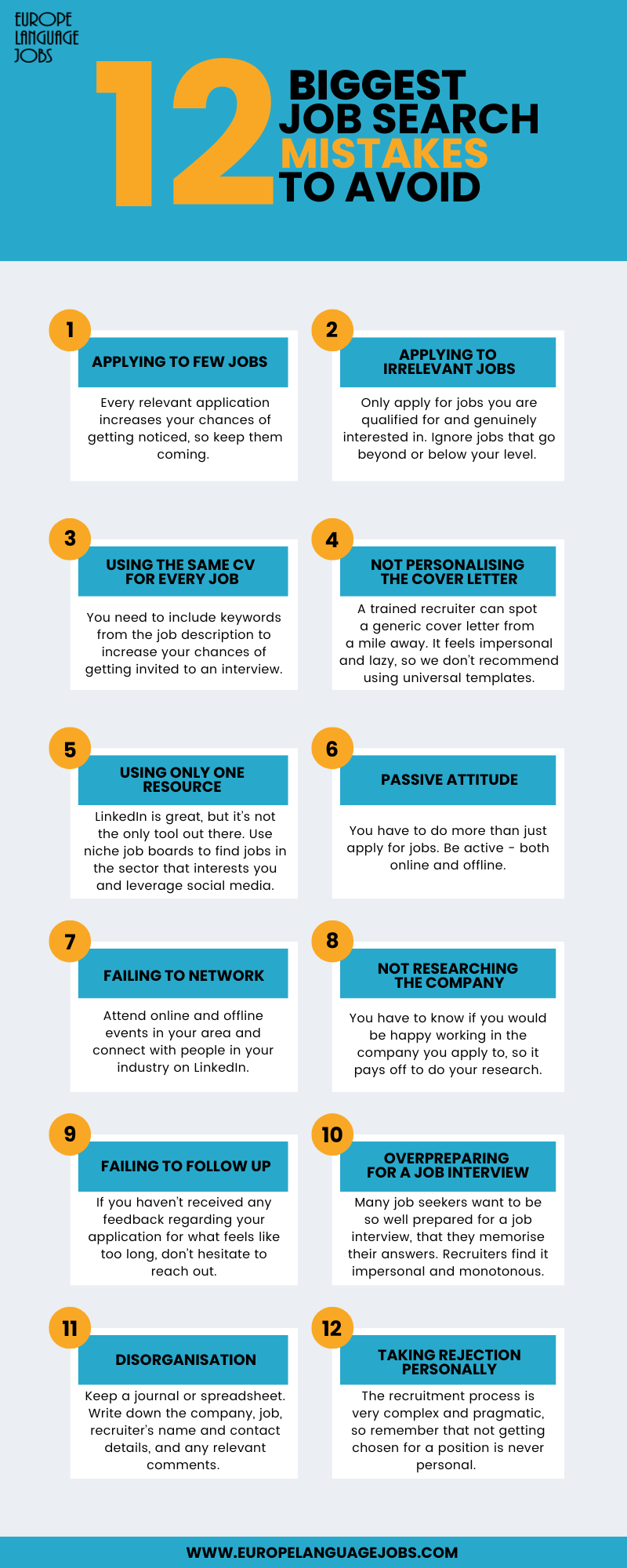We regularly talk to hundreds of job seekers, listening to their pain points, struggles, and complaints. We want to know which parts of the job search are the most challenging so that we can provide the best experience possible as a job board.
We also talk to recruiters who have their thoughts about how job seekers could improve their chances of getting hired. These conversations give us many insights into candidates’ job-searching habits and potential areas for improvement.
We provide a lot of career advice, but this time, we wanted to gather our observations and turn them into a guide for modern job seekers.
Learn about the most common job search mistakes to avoid and how to make sure you don’t commit them.
Overview
The most common job search mistakes involve applying to irrelevant jobs, failing to tailor a CV and cover letter, having a passive attitude and a weak online presence, and underestimating the importance of networking. Follow our advice to avoid them and increase your chances of getting hired.

12 biggest job search mistakes to avoid

1. Applying to few jobs
In an ideal world, we would be hired for every job we are qualified for. However, in reality, it takes between 100 and 200 applications to find a job.
The more jobs you apply to, the bigger your exposure. Every relevant application increases your chances of getting noticed, so keep them coming.

2. Applying to irrelevant jobs
On the other hand, every application takes time. You need to personalise your CV and cover letter and do company research.
Therefore, applying to multiple jobs doesn’t mean applying to every job you find. Choose only those you are qualified for and genuinely interested in. Ignore jobs that go beyond and below your level.
You don’t always have to tick all the boxes. Job descriptions usually leave some wiggle room. Employers are willing to hire candidates who don’t fulfil all the requirements but are motivated, have training potential, or are a good match personality-wise.
However, applying for jobs that have nothing to do with your seniority or experience is a waste of time - both yours and the recruiter’s.

3. Using the same CV for every job
Sending the same CV to every employer is another job search mistake to avoid.
Nowadays, most companies use Applicant Tracking Systems (ATS). They are software designed to filter CVs based on keywords. Only the resumes with the required number of keywords will be reviewed by recruiters.
That’s why you have to tailor your CV for every application. You need to include keywords from the job description to increase your chances of getting invited to an interview. If you use a universal template, your resume won’t even make it into human hands.

4. Not personalising the cover letter
Cover letters aren’t scanned by ATSs as commonly as CVs, but we don’t recommend using universal templates either way. A trained recruiter can spot a generic cover letter from a mile away. It feels impersonal and, frankly, lazy.
Your cover letter is your chance to shine. Take it. A CV only contains dry facts. A cover letter can show your personality and motivations. Make sure it is tailored for every position to wow the recruiters.

5. Using only one resource
One of the biggest job search mistakes to avoid is limiting yourself to only one resource. LinkedIn is great, but it’s not the only tool out there.
Use niche job boards to find jobs in the sector that interests you. For example, Europe Language Jobs collects vacancies with languages in different European countries. If you want to find a job abroad, using this job board will save you time, as it will only show relevant positions.
Don’t forget to leverage social media. It’s a great place to network, but also to find new opportunities. More and more companies advertise fresh vacancies on their social media profiles. Overlooking this resource will set you back in your job search.

6. Passive attitude
Applying for jobs is not enough. Everybody is doing that.
To stand out from the competition, you have to do more.
Be active, online and offline. Follow companies you’d like to work in and industry thought leaders on social media. Network, engage, and repost. React and comment on other people’s posts and publish your own, original content.
Employers want to hire motivated, passionate candidates. They research applicants’ online presence and prefer those who contribute to the community and express their interest in the industry.
Attend industry events, webinars, and networking sessions. You never know when you might meet someone who knows someone who knows of a job that’s perfect for you.

7. Failing to network
There is an ongoing debate about whether the data claiming that 80% of jobs are never advertised is accurate.
However, the main message behind this statistic still stands: networking gets you hired.
The concept of networking can be overwhelming and although it is commonly talked about, many people don’t know where to start. And most of them don’t make the effort to find out.
This is your chance to shine. Attend online and offline events in your area. Connect with people in your industry on LinkedIn. You don’t have to talk to everyone - start off slow and warm your way up, until you feel more comfortable interacting with strangers.
It’s a common tactic in the professional world, so doing it is nothing weird. And not doing it is one of the biggest job search mistakes to avoid.

8. Not researching the company
Many people disregard the importance of company research during job search. After all, preparing all the necessary documents takes up enough time.
But if you omit this step, you only spite yourself. You have to know if you would be happy working in the company you apply to. And you need to have background knowledge to present during the job interview.
It pays off to dedicate a bit of time to research every company before you apply. You will have to do it at some point, so the sooner, the better.

9. Failing to follow up
Too many candidates assume that if they don’t receive a response, then that’s just the way it’s gotta be.
Not necessarily!
Recruiters are busy people. And they are, first of all, people. Even with all the technology they’re using, there is still a small possibility they might overlook one application or forget to send an email.
A polite follow-up will get your message back to the top of their inbox. If you haven’t received any feedback regarding your application for what feels like too long, don’t hesitate to reach out.
Not to mention, sending an interview follow-up email is highly recommended. Thank the recruiter for their time and express your interest in the job once again. Failing to do so may be one of your biggest job search mistakes.

10. Overpreparing for a job interview
Awareness of the necessity to prepare for a job interview is common knowledge nowadays. In fact, now the tables have turned and recruiters often encounter another job search mistake to avoid.
That mistake is the exact opposite of failing to prepare. Now, candidates come to interviews too prepared, meaning they memorise their answers beforehand.
Don’t do that. A recruiter can tell if you’re reciting things from memory and telling them what you think they want to hear. That won’t get you the job.
Prepare model answers for the most common interview questions and do company research, but leave some room for spontaneity so that the conversation flows naturally.

11. Disorganisation
During periods of intense job hunt, we apply for jobs and send CVs left to right. It’s impossible to remember every company and role you applied to if you don’t find a way to keep track of them.
It looks very unprofessional when a recruiter calls you and you’re not sure which company they represent. Or when it turns out that the interview is about a different job than you’d thought.
Avoid featuring in a recruitment horror story by staying organised. Keep a journal or spreadsheet where you will document every application. Write down the company, job, recruiter’s name and contact details, and any relevant comments.

12. Taking rejection personally
We left one of the biggest job search mistakes for the end because we wanted it to resonate.
Rejection in a job search is never personal. The entire recruitment process is very complex and, frankly, very pragmatic. Recruiters are given a sketch of an ideal candidate and their job is to find someone who matches it as closely as possible.
But remember that those sketches look different in every company. The fact that you weren’t hired doesn’t mean you’re not worthy or qualified. There are so many factors behind the employer’s decision, which go beyond qualifications, skills, and experience.
Ideally, the perfect candidate should also be a good match personality-wise to get along with the rest of the team. Maybe you’re an amazing person, but just wouldn’t get along with the other coworkers for some reason.
The company culture is also an important aspect. Maybe your vision, values, and goals simply don’t align with a particular company but will be in line with another one.
A candidate who isn’t chosen by one employer might be the perfect hire for another one. Rejection is always difficult to process, but remembering that it’s not personal could help lessen the blow.
Are you guilty of making some of these biggest job search mistakes? You can easily avoid them by following our advice. Now that you are aware of them, it will be easier to replace them with healthy habits and bring your job search strategy to a new level.
Feeling inspired? Visit our blog for more career advice! How can you be sure the information we provide is top-notch? We are a group of professionals working with recruiters, career coaches, and HR specialists from all over the world!
Trust our experience and let us help you find a new job in Europe!


















Abdullah Alpay Ata1y ago
Thanks, it is really helpful.
Thanks, it is really helpful.